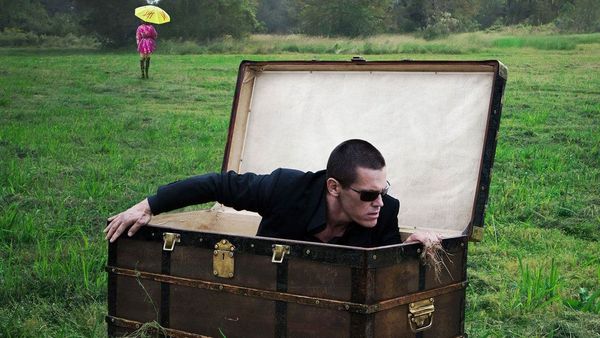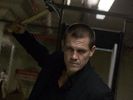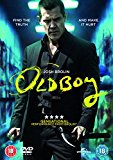Eye For Film >> Movies >> Oldboy (2013) Film Review
Oldboy
Reviewed by: David Graham

One of the first Korean films to make a major international impact, Park Chan-wook’s unhinged Manga adaptation Oldboy was perhaps over-praised – its length and absurdity meant it was far from perfect – but it exposed a new worldwide audience to the joys of Asian cinema, beyond the lank-haired spooks and yakuza showdowns that threatened to ghettoise it. The much-mooted remake starring Will Smith and directed by Steven Spielberg thankfully failed to materialise, but the announcement of Spike Lee’s involvement in the resuscitated project temporarily placated some of its detractors. There’s no denying that Chan-wook’s cult fave is considerably edgier and darker than Lee’s (admittedly compromised) new vision, but for all its perceived redundancy, the veteran director brings more than enough to the table to make his version well worth watching, knee-jerk die-hards be damned.
Businessman Joe Doucett is having a bad day – he’s screwed up a make-or-break deal, angered his estranged wife by forgetting his infant daughter’s birthday, and ended up so blasted he’s spewing all over the sidewalk in a foetal position. Waking up in what looks like a fleapit hotel, Joe is flummoxed to find he can’t leave, unable to glean any insight into his predicament despite the mysterious delivery of a Chinese takeaway and bottle of vodka every day. As the weeks turn to years, Joe forsakes the booze and uses the endless workout programmes and kung fu movies to whittle himself into shape, plotting escape and revenge on whoever he might have wronged badly enough to want him imprisoned. His eventual release turns into a race against time to put together the pieces of the conspiracy, with his mysterious nemesis threatening to kill the daughter he’s never known and a kindly young woman dragged into his dangerous orbit.

For everything that’s predictably lost in translation, there’s actually some tasty new meat on this narrative’s bones. As a fable of catharsis there’s a strange, Buddhist undertow to this story that is served well by several of I Am Legend screenwriter Mark Protosevich’s changes - including the revised, full-circle ending, which manages to be almost as emotionally rousing as its predecessor’s despite lacking its ambiguity - while the sense of satire is elevated by the juxtaposition of the US setting and American characters with the surreal Asian source material. This is exemplified during Joe’s drunken exchange with an Asian street merchant, whose contempt for his Yankee yuppie insouciance is plain to see, while his later disgust at having to cruise a list of Asian restaurants with ‘Dragon’ in the title in order to identify the origin of the dumplings he’d been forced to live on provides one of the most humorously twisted moments, Karma biting him back at every turn.
Lee also injects some canny commentary during the passing of his protagonist’s imprisonment, surveying the 20-year interim through news reports that take in everything from 9/11 to Katrina, echoing his very personal documentary work. He suggests the everyday American’s helplessness via Joe’s incarceration throughout all this historical upheaval, and also a sense of how little African Americans’ positions have improved in reality through his brother’s cameo as the non-existent bell-hop and Samuel L Jackson’s turn as a hoodlum-turned-warden, putting on his best formal accent as he takes bookings for his rich white clients.
The original’s run-time occasionally felt like a slog, where this version – butchered down by the studio from Lee’s 140 minute cut to a paltry 108 – feels like a sprint, almost to its disservice. It certainly compliments the trashy nature of the plot, leaving less time to ponder its overwrought machinations, while it also helps distract from how derivative it all feels. The most obvious influence would be Fincher’s The Game, but there’s also a clear debt to Warrior King in the pivotal fight sequence (which feels far more gratuitous and hard-to-swallow than Chan-Wook’s game-changing set-piece, despite being shorter and less vicious), while the long sweeping takes are perfectly in keeping with the story’s operatic flourishes but can come off like Brian De Palma-style show-boating.
Animal lovers will be relieved to hear that no octopuses were harmed for this remake (a sub-Cannibal Holocaust stunt that sullied the original for some), but there is an equally cruel (simulated) scene that ties nicely into Lee’s flip sense of black humour, as does a subsequent face-to-beak fish-tank encounter. Joe’s sidekick and love interest Marie is given more depth here, with a Samaritan streak that ties believably into her gradually revealed back-story, while making Joe’s enemy an effete, mincing Englishman with a slightly altered – and even more unsettling – raison d’etre adds another layer to the racial and socio-political stew, Lee making efforts to set up a class-war house of cards amongst his players.
The performances are key to controlling the slippery tone, with Brolin echoing his world-weary No Country For Old Men breakout but with even more consternation and an air of physical menace that belies his advancing age. He really gives his all, and is ably backed by a haunted but passionate Elizabeth Olsen and Lee regular Michael Imperioli’s warm presence as Joe’s loyal bartender. Jackson goes big and brash as the ludicrously Mohawk-ed gang-banger – he’s as pleasurably oily here as he was in Django Unchained – while Sharlto Copley rounds out a year of memorable villainy with the flipside to his Elysium thug, clearly revelling in the unashamed silliness of the revelation-heavy second half where the original wallowed in self-important solemnity.
There’s definitely enough variation here to make this new Oldboy an enjoyably bumpy ride for fans of the original, and its worth will be increased for the uninitiated, for whom it will be a taut thrill-ride into some unexpectedly uncomfortable places. It’s also nearly as nuttily entertaining as the original, dripping with gleefully amoral violence and sordid detail, while the gorgeous cinematography and striking design combine with the melodramatic soundtrack to create a heightened sense of uncouth fantasy. Lee could never replicate the stunning impact of Chan-Wook’s Vengeance trilogy high-point, but this is a solid entry in an oeuvre that until recently (sterling documentary work withstanding) was becoming increasingly erratic.
Reviewed on: 10 Dec 2013


















